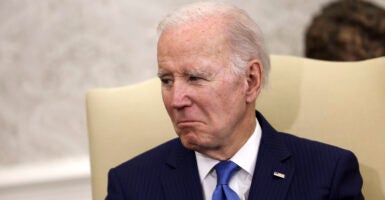One day before Americans were casting their final votes in the midterm elections, officials with the National Archives and Records Administration were negotiating with lawyers for President Joe Biden about collecting boxes of documents from a law office in Boston.
It was on Election Day that National Archives officials met with Biden lawyers to collect documents at the Washington offices of the Penn Biden Center for Diplomacy and Global Engagement, where classified documents had been stored. The attorney for the archives informed a Biden attorney the agency would send a van to pick up the boxes.
“Also, please ensure that the boxes in your office in Boston remain secure in a locked space and are not accessed by anyone,” Gary Stern, general counsel for the National Archives, wrote to Biden lawyer Patrick Moore of the Boston firm of Hemenway & Barnes in a Nov. 7 email.
This is from 74 pages of emails obtained through a Freedom of Information Act request by The Heritage Foundation’s Oversight Project and others to the National Archives regarding the Biden classified documents. (The Daily Signal is Heritage’s multimedia news organization.)
The National Archives released the emails Friday afternoon. Most other pages dealt with matters already known, such as the Penn Biden Center.
The boxes of documents in the Boston law office mark a new wrinkle in the unfolding timeline of where documents from Biden’s time as vice president were stored. It’s not clear from the emails if any of the documents in the Boston law office were classified.
This also highlights again how the Biden administration—including the agency tasked in part with government transparency—was silent with the public about the classified documents stored by Biden from his time as vice president in the days leading up to the midterm elections, and the weeks after before this was first reported by CBS News.
National Archives Chief Operating Officer William Bosanko emailed colleagues the day before Election Day, saying, “Things are rapidly changing behind the scenes. I will follow-up with some notes shortly.”
It was on Election Day that Stern followed up with Moore to say, “Pat, we would like to pick up the boxes that are in your Boston office and move them to the JFK Library. Would it be possible to do that tomorrow?”
The John F. Kennedy Presidential Library and Museum—like most other presidential libraries—is run by the National Archives.
Moore was agreeable. “Yes, it would. I will still be in DC, so I will link you with my colleague, with whom you may have dealt in the past on other matters related to the Kennedy archives.”
Moore continued:
He will be at my office by approximately 8 AM tomorrow through approximately 2 PM, at which time he needs to attend an off-site meeting. If a pick-up time after 2 PM is preferred, either he or I will link you with someone to facilitate it. I will follow your lead on how best to make that connection; I’m happy, for example, to simply add him to this email chain.
Earlier in the day, Bosanko told Moore the agency would send a “US Gov van” to pick up the documents, and asked for a “rough box count.”
As many Americans were watching the election results begin to roll in on the night of Nov. 8, Bosanko sent another email to Moore at 8:50 p.m.
“I do not believe that they can be there before 11:00 a.m. That location does not have an assigned vehicle, so they likely will come in a van associated with our security contractor,” he wrote. “Would you be able to provide a parking space to allow ease of access and loading?”
Moore replied six minutes later: “I believe we can accommodate parking and will confirm.”
Attorney General Merrick Garland has appointed veteran federal prosecutor Robert Hur as special counsel to investigate the matter.
Have an opinion about this article? To sound off, please email [email protected] and we’ll consider publishing your edited remarks in our regular “We Hear You” feature. Remember to include the url or headline of the article plus your name and town and/or state.





























